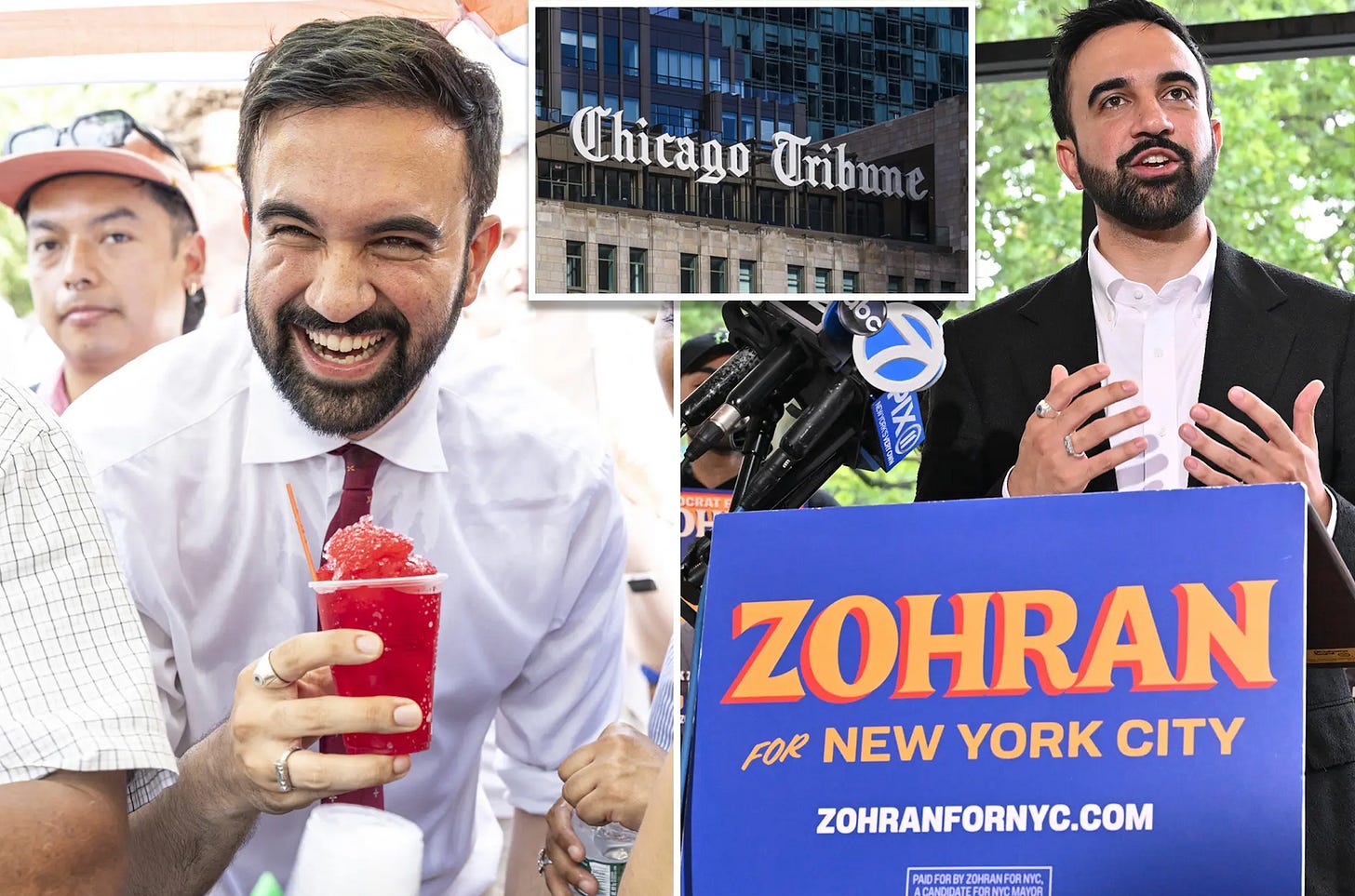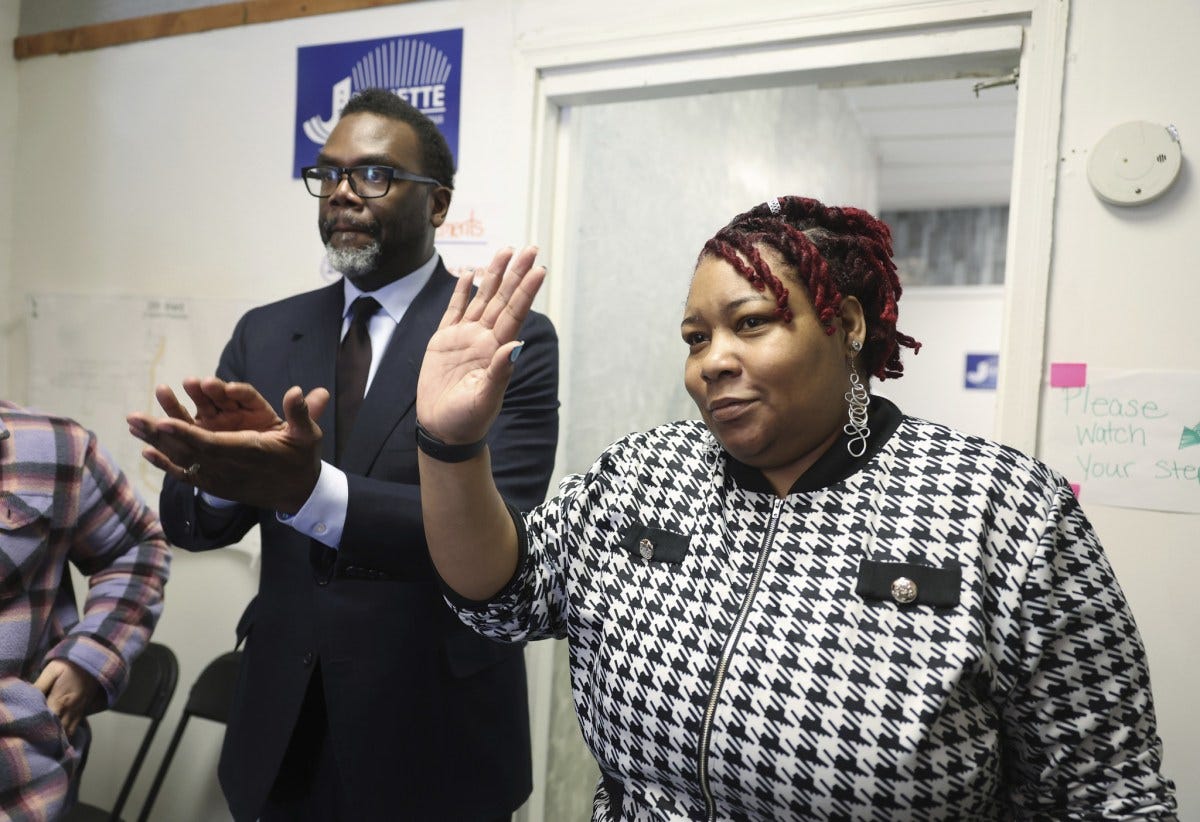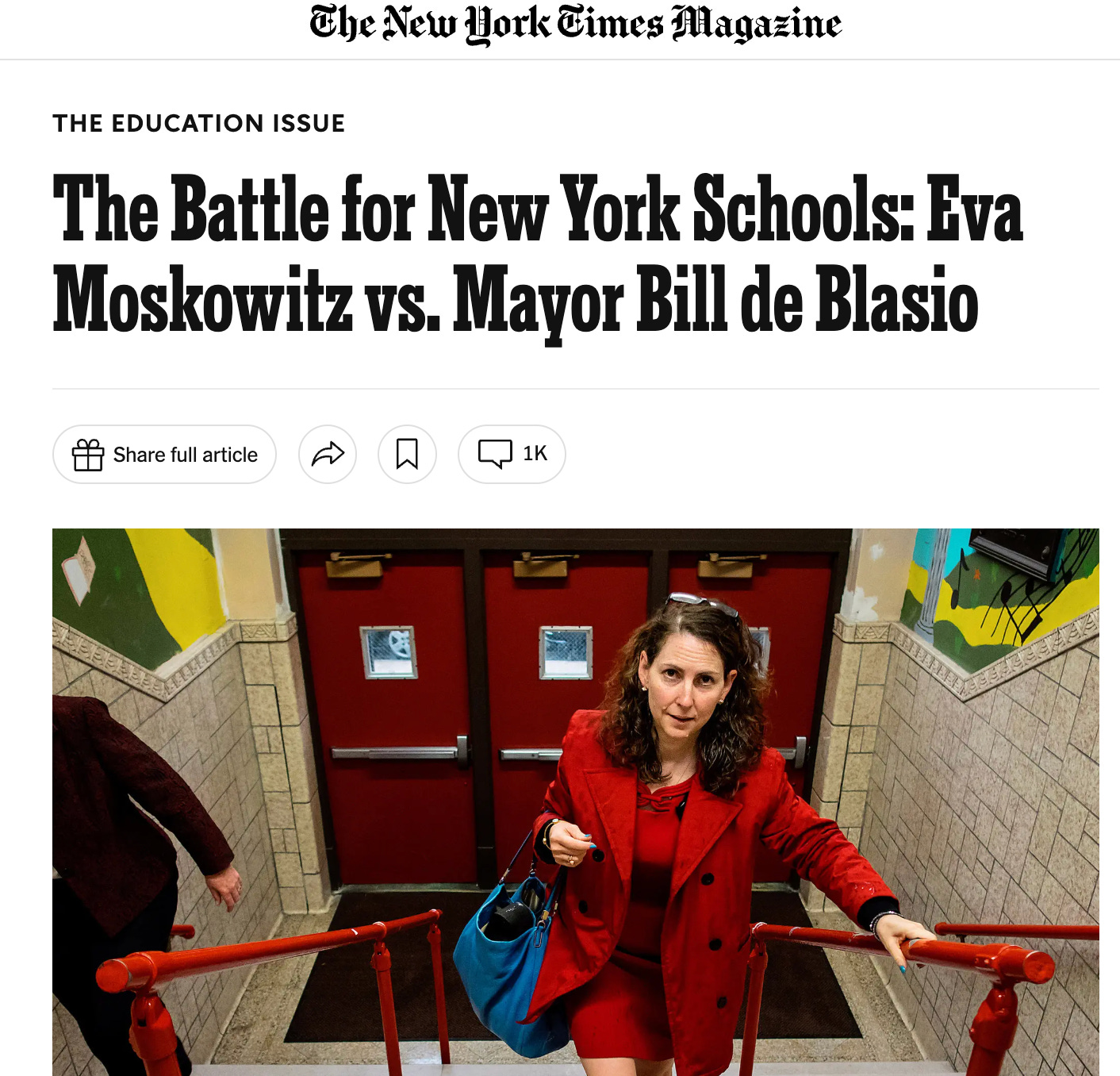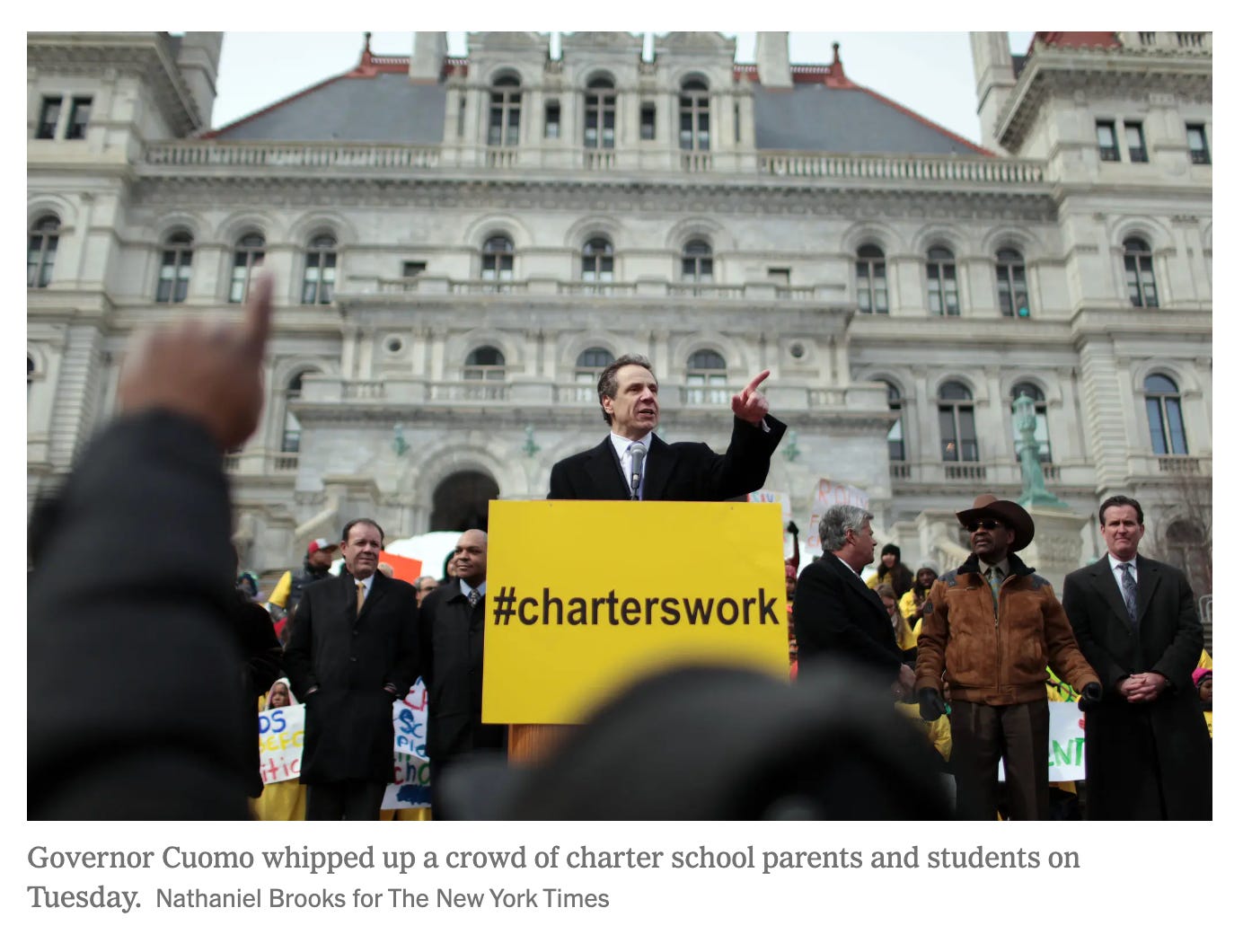What Mamdani Can Learn from Chicago’s Struggles
Brandon Johnson’s early successes were quickly overshadowed by relentless and well-funded opponents.
In 2023, Chicago’s left-wing coalition secured a historic victory. Brandon Johnson, a Black educator and community organizer backed by the powerful Chicago Teachers Union (CTU), became the city's mayor. Yet within two short years, Johnson’s administration faced relentless attacks, plummeting approval ratings, and repeated setbacks driven not simply by policy failures, but by a sophisticated opposition network that dictated the political narrative.
As Queens Assemblymember Zohran Mamdani gets closer to becoming the next Mayor of New York City, the detailed case study of Johnson’s tenure—recently dissected by Chicago organizers Alex Han, Asha Ransby-Sporn, and Alderwoman Jeanette Taylor in a revealing live interview on Daniel Denvir’s The Dig podcast—offers urgent lessons.
Alex Han, executive director of In These Times, described Chicago progressives’ vulnerability succinctly: “There is not going to be a break. You don’t get to take off on Sunday. At every moment, these people are going to be trying to undermine you. They have the resources to do this.”
"These people," as Han and his colleagues explained, constitute a formidable opposition: a well-funded and carefully organized coalition of real estate interests, the charter school industry, pro-Israel political networks, the Democratic Party establishment, and corporate media outlets. They operate primarily through 501(c)(4) entities that strategically shapes public perception through relentless communications.
Asha Ransby-Sporn detailed how thoroughly this infrastructure influences political narratives: “Two and a half years before the next election, they are sending mailers, sending text messages…everything newsworthy that's happening in city council, they are sending negative messages to every single city council person in the Progressive Caucus. Fear-mongering, spreading misinformation, literally lying.”
This campaign of misinformation was not isolated or reactive; it was strategic infrastructure. Every policy action by Johnson's administration was immediately reframed negatively. Ransby-Sporn emphasized how critical this infrastructure became, noting, “We are facing a $10 million C4 entity…I just can't understate how active they are, how threatened they are, and how much energy they are putting into interpreting our political reality.” There have been allegations of paid protesters, mobilization of suburban Republicans to disrupt mayoral events, and the use of bot farms to fabricate the appearance of organic outrage from within the mayor's own coalition.
The organized opposition’s power to shape public perception was vividly demonstrated in the defeat of the Bring Chicago Home referendum in March 2024. Despite robust polling support, clear ballot language, and a massive grassroots campaign contacting over a million voters, the referendum lost. Ransby-Sporn explained the mechanics of this defeat: “There was a ton of misinformation. There were ads run making people think it would make their property taxes go up…playing up anti-migrant sentiment, Black-brown tensions, and this idea that this was money that was not gonna benefit long-term Chicagoans. Which is absolutely not what it was.”
The opposition’s campaign relied on exploiting deep-seated fears and racial divisions, successfully redefining a popular, well-crafted housing initiative into something voters rejected. Ransby-Sporn admitted strategic shortcomings on their side: “We were just trying to be like, ‘We're right on the policy and we know people agree with us.’ And they then took up the space of tapping into how people were feeling.”
This fundamental gap between policy and emotional narrative is a defining lesson for Mamdani. Chicago’s progressive coalition lacked the ability to effectively shape how voters interpreted their actions, ceding control of the narrative to their opponents.
The opposition’s influence extended even into realms typically insulated from partisan media battles. Alex Han underscored one unprecedented incident: during a recent leadership challenge inside the Chicago Teachers Union, the opposition’s candidate received a primetime interview on local Fox 32 News. “I have never seen a candidate for internal union office be interviewed on primetime local news,” Han noted. “These things happen on a weekly basis here in Chicago.”
Chicago Alderwoman Jeanette Taylor underscored another structural barrier Johnson faced—an entrenched power structure resistant to change: “Just because you changed the top, cutting off the head, the body's still wiggling. They've been wiggling shit for 30, 40 years.” Taylor argued passionately that Johnson was hampered not simply by his intentions or promises, but by the formidable resistance embedded deep within the municipal government: “Politics and government are two fucking different things. What I say I'ma do when I'm on the door is rainbows and sunshine. When I get in office, I don't realize there are 26 fucking (legislators) who might vote against the interest of what I'm trying to do.”
Taylor also stressed Johnson’s political isolation due to inadequate planning during the critical transition period: “I think the part that we failed on, and I failed, that's taken us a little longer is to just learn those systems.” Ransby-Sporn similarly reflected on the Johnson transition: “It involved so many people that they wanted to feel like had a seat at the table, that it ended up being more about generating that feeling for a bunch of people than developing a solid plan.”
“When progressives run for high office it’s critical to be ready to govern,” Representative Chuy Garcia told NBC News. “Governing entails striking a balance between promises made (ideals) and making the wheels of government turn. Need to assemble a team that understands your priorities and deliver services, keep relationships with stakeholders especially a base while expanding through engagement. Intergovernmental relationships need to be really keen.”
For Mamdani, these insights are critical. The lesson from Johnson’s tenure is not simply about winning office; it is about creating robust infrastructure to control political narratives and counteract deeply entrenched opposition. Mamdani must build an infrastructure that proactively defines his policies and counters misinformation.
As the American Prospect noted:
Johnson allies think his successes have been rarely covered by national media. Johnson ended the subminimum wage for tipped workers and mandated ten days of paid leave for workers. He reopened several city-run mental health clinics and increased funding for youth summer jobs. The city council approved his $1.25 billion housing and economic development bond, and recently passed a plan to build “green social housing” through public-private partnerships.
Chicago’s experience starkly illustrates that progressive leaders must anticipate a sophisticated opposition that will not wait for failures—it will create them. As Taylor emphasized, Johnson’s opponents were organized and active from even before Day One. Mamdani must be ready for opponents who will use dark-money super PACs, misinformation, and AI-driven information warfare to keep him constantly reacting and on defense—unable to proactively advance or deliver on his agenda. Without strong political and communications infrastructure, he risks losing control of the narrative, with perceptions dictated by whoever pays the most.
Yet, the experience of Chicago is far from unique. Just two months into Mayor Bill de Blasio’s administration in early 2014, he faced a multimillion-dollar independent expenditure campaign launched by the charter schools sector. Funded primarily by Families for Excellent Schools (FES)—an advocacy group bankrolled by wealthy philanthropies and hedge-fund executives closely aligned with Eva Moskowitz’s Success Academy—over $3.6 million was spent within just three weeks on emotionally resonant TV ads branding de Blasio as an obstacle to educational opportunity. These ads aired prominently across New York City, often deploying narratives featuring young Black and brown children and their anxious parents, effectively framing the new mayor’s early decisions as harmful to the city’s most vulnerable:
“Mayor Bill de Blasio talks about the Tale of Two Cities, but yet he wants to take away options from the communities that need it the most.”
“My daughter would have better opportunity at a charter school.”
“Charter school is doing so great for my son. I don’t know why he wouldn’t be supportive of that.”
The swift, well-financed campaign succeeded in forcing a significant legislative concession, demonstrating that the sophisticated opposition network Mamdani may face is neither unprecedented nor confined to Chicago.
Ultimately, progressive leaders like Johnson and Mamdani must recognize that winning office isn't the finish line—it's just the starting point. It's like carefully building a fortress but never staffing or maintaining it. The day you celebrate victory, subtle erosion begins, quietly weakening the structure from within. Without proactive political and communication infrastructure to shape public perception and swiftly counter misinformation, progressive accomplishments become fragile, easily reframed by wealthy opponents eager to tell their own stories. The real contest, then, isn’t merely securing power or passing policy; it’s preserving your ability to define reality itself.






Johnson and his supporters need to grapple with the inexperience and ineffectiveness that quickly undermined his administration's legitimacy. For example, there's nothing progressive about trying to set up a shelter for New Arrivals on a toxic Superfund site.
The issue for Johnson and, likely, Mamdani is partly that the opposition tends to be better organized. But it's also that progressive ideas typically have support of a large minority, not a majority. In other words, the majority of people and interests will oppose a very progressive agenda. Most progressive mayoral candidates end up winning by competing in a multi-candidate field where they can win with a plurality. The biggest mistake is thinking that plurality support in a primary and/or general election will magically translate into majority support when governing.
This underlines Waleed's points: assume the opposition will be well organized and figure out how to compete with them. But the article acts as if the only impediment is opposition communication when it's actually structural: most people oppose these views.